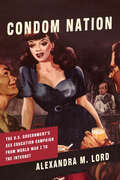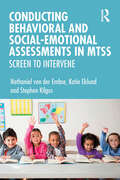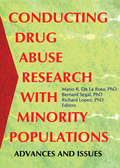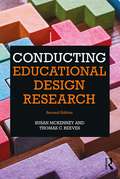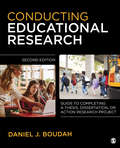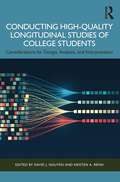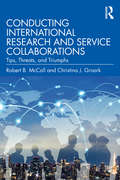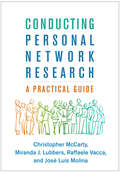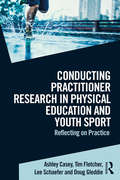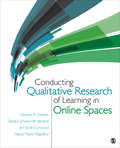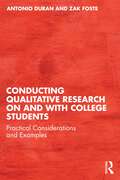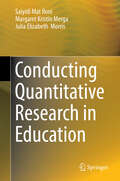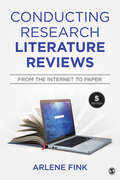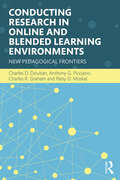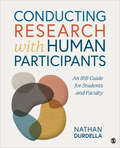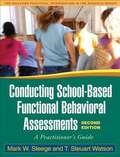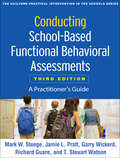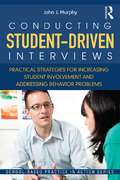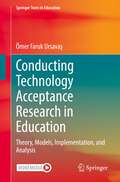- Table View
- List View
Condom Nation: The U.S. Government's Sex Education Campaign from World War I to the Internet
by Alexandra M. LordAward for the Public Understanding of Science, 2010, British Medical Association's Board of ScienceFirst Prize, Popular Medicine, British Medical Association 2010 Book AwardsThis history of the U.S. Public Health Service's efforts to educate Americans about sex makes clear why federally funded sex education has been haphazard, ad hoc, and often ineffectual.Since launching its first sex ed program during World War I, the Public Health Service has dominated federal sex education efforts. Alexandra M. Lord draws on medical research, news reports, the expansive records of the Public Health Service, and interviews with former surgeons general to examine these efforts, from early initiatives through the administration of George W. Bush. Giving equal voice to many groups in America—middle class, working class, black, white, urban, rural, Christian and non-Christian, scientist and theologian—Lord explores how federal officials struggled to create sex education programs that balanced cultural and public health concerns. She details how the Public Health Service left an indelible mark on federally and privately funded sex education programs through partnerships and initiatives with community organizations, public schools, foundations, corporations, and religious groups. In the process, Lord explains how tensions among these organizations and local, state, and federal officials often exacerbated existing controversies about sexual behavior. She also discusses why the Public Health Service's promotional tactics sometimes inadvertently fueled public fears about the federal government’s goals in promoting, or not promoting, sex education.This thoroughly documented and compelling history of the U.S. Public Health Service's involvement in sex education provides new insights into one of the most contested subjects in America.
Condom Nation: The U.S. Government's Sex Education Campaign from World War I to the Internet
by Alexandra M. LordAn award-winning history of the U.S. Public Health Service’s haphazard efforts to educate Americans about sex for more than a century.Since launching its first sex ed program during World War I, the Public Health Service has dominated federal sex education efforts. Alexandra M. Lord draws on medical research, news reports, the expansive records of the Public Health Service, and interviews with former surgeons general to examine these efforts, from early initiatives through the administration of George W. Bush.Giving equal voice to many groups in America—middle class, working class, black, white, urban, rural, Christian and non-Christian, scientist and theologian—Lord explores how federal officials struggled to create sex education programs that balanced cultural and public health concerns. She details how the Public Health Service left an indelible mark on federally and privately funded sex education programs through partnerships and initiatives with community organizations, public schools, foundations, corporations, and religious groups. With engaging and insightful analysis, Lord explains how tensions among these organizations exacerbated existing controversies about sexual behavior. She also discusses why the Public Health Service’s promotional tactics sometimes fueled public fears about the federal government’s goals in promoting, or not promoting, sex education.Award for the Public Understanding of Science, 2010, British Medical Association’s Board of ScienceFirst Prize, Popular Medicine, British Medical Association 2010 Book Awards
Conducting Behavioral and Social-Emotional Assessments in MTSS: Screen to Intervene
by Nathaniel von der Embse Katie Eklund Stephen KilgusConducting Behavioral and Social-Emotional Assessments in MTSS: Screen to Intervene offers effective assessment strategies for improving mental and behavioral health decision-making within multi-tiered systems of support. Accessible to school psychologists, behavior analysts, PBIS team leaders, and other school-based professionals, this applied book features evidence-based practices and case study examples to show how assessment data can drive prevention and intervention services, particularly at Tiers 1 and 2. Specific tools and recommendations for universal screening, problem analysis, and progress monitoring procedures offer a fresh, real-world approach to data-driven implementation of supports across schools.
Conducting Drug Abuse Research with Minority Populations: Advances and Issues
by Bernard SegalBe a better researcher when studying drug abuse among minorities! Conducting Drug Abuse Research with Minority Populations: Advances and Issues brings you the voices of drug abuse researchers who discuss the most important concerns about conducting research in drug-taking minority populations. In this strategy-based book, you&’ll find yourself beneficially involved in a discussion of many of the central methodological advances facing researchers today, specifically in the target area of minority communities and their drug-using societies. Conducting Drug Abuse Research with Minority Populations presents crucial recommendations and strategies that will lead you toward unprecedented effectiveness and efficiency when researching this subsection of the world&’s drug users. In addition, find new ways to involve community members in the research process, and you&’ll come to more fully understand the impact of cultural values, attitudes, and norms in the drug-taking patterns of minority persons. With this book, you will learn more about: the importance of advisory boards, gatekeepers, and indigenous workers in this type of research the crucial role of incentives in recruiting and retaining minority persons in drug abuse studies focus groups as tools to minimize selection bias of minority subjects how cultural values may affect research strategies how research teams can facilitate the collection of data within minority communities Researchers, college educators, and substance abuse practitioners will find that Conducting Drug Abuse Research with Minority Populations improves their efforts to produce more viable data in a much shorter time span.
Conducting Educational Design Research: Contributing To Practice And Theory Through Practitioner-researcher Collaboration
by Thomas C Reeves Susan McKenneyEducational design research blends scientific investigation with the systematic development and implementation of solutions to educational challenges. Empirical inquiry is conducted in real learning settings – not laboratories – to craft effective solutions to the complex challenges facing educational practitioners. At the same time, the research is carefully structured to produce theoretical understanding that can serve the work of others. Conducting Educational Design Research, 2nd Edition has been written to support graduate students as well as experienced researchers who are new to this approach. Part I describes the origins, outcomes, and generic approach. Part II discusses the core processes of the generic approach in detail. Part III recommends how to propose, report, and advance educational design research. In addition to expanded treatment of research goals and practicalities, more examples, and attention to design-based implementation research, this new edition features enhanced guidance. For each of the four core processes, this volume offers: assessment tools detailed, behind-the-scenes descriptions of actual project work examples of how specific theories have been used to enrich the work For decades, policies for educational research worldwide have swung back and forth between demanding rigor above all other concerns, and increasing emphasis on impact. These two qualities, rigor and impact, need not be mutually exclusive. This volume supports readers in grasping and realizing the potential of educational design research. It demonstrates how rigorous and relevant investigation can yield both theoretical understanding and solutions to urgent educational challenges.
Conducting Educational Research: "Guide to Completing a Thesis, Dissertation, or Action Research Project"
by Daniel Joseph BoudahDesigned to be used during the research process, Conducting Educational Research: Guide to Completing a Thesis, Dissertation, or Action Research Project, Second Edition walks readers through each step of a research project or thesis, including developing a research question, performing a literature search, developing a research plan, collecting and analyzing data, drawing conclusions, and sharing the conclusions with others. Throughout the book, Daniel J. Boudah covers all types of research (including experimental, descriptive, qualitative, group designs, and single subject designs) and helps readers link research questions to designs, designs to data sources and data sources to appropriate analyses. Each chapter includes activities and exercises to ensure the researcher is asking the right questions and producing a quality project.
Conducting Educational Research: "Guide to Completing a Thesis, Dissertation, or Action Research Project"
by Daniel Joseph BoudahDesigned to be used during the research process, Conducting Educational Research: Guide to Completing a Thesis, Dissertation, or Action Research Project, Second Edition walks readers through each step of a research project or thesis, including developing a research question, performing a literature search, developing a research plan, collecting and analyzing data, drawing conclusions, and sharing the conclusions with others. Throughout the book, Daniel J. Boudah covers all types of research (including experimental, descriptive, qualitative, group designs, and single subject designs) and helps readers link research questions to designs, designs to data sources and data sources to appropriate analyses. Each chapter includes activities and exercises to ensure the researcher is asking the right questions and producing a quality project.
Conducting High-Quality Longitudinal Studies of College Students: Considerations for Design, Analysis, and Interpretation
by Kristen A. Renn David J. NguyenThis guide informs the construction and execution of studies exploring college student development over time.Longitudinal studies represent a gold standard for understanding college student experiences and outcomes, yet many scholars partake in single-time surveys and interviews to avoid the challenges that occur during prolonged investigation. This book walks researchers through each step of the process, including strategies for avoiding mistakes in design, coping with unexpected variables, and learning lessons from real-world research experiences.This volume is a useful companion for educational researchers considering, planning, or launching longitudinal designs, and it also functions as a practical supplement for graduate courses focusing on research methods and/or college students.
Conducting International Research and Service Collaborations: Tips, Threats, and Triumphs
by Robert B. McCall Christina J. GroarkConducting International Research and Service Collaborations: Tips, Threats, and Triumphs provides academic researchers, as well as non-profit and private professionals, with much-needed guidance on how to plan, implement, and manage international research and intervention projects. Accessibly written and illustrated throughout with examples and case studies of projects from Robert B. McCall and Christina J. Groark's wide-ranging and decades-long experience of cross-border collaborations, this book outlines how to prepare for and ensure success of cross-border research projects and interventions, how to embrace unique circumstances you may encounter, and what to do if things go wrong. Each chapter covers a general domain of concerns, advice, and lessons learned in conducting international collaborative projects followed by concrete illustrations that pertain to them. Key topics covered include launching projects and working with stakeholders, travelling and living abroad, cultural considerations, planning and funding, administrative issues, dealing with crises, and successfully implementing and disseminating findings effectively. This comprehensive guide is ideal for researchers and project managers – from large, global organizations to small NGOs, human services, private industry, and other fields embarking on such projects, as well as university students and academics.
Conducting Personal Network Research: A Practical Guide (Methodology in the Social Sciences)
by Christopher McCarty Miranda J. Lubbers Raffaele Vacca José Luis MolinaWritten at an introductory level, and featuring engaging case examples, this book reviews the theory and practice of personal and egocentric network research. This approach offers powerful tools for capturing the impact of overlapping, changing social relationships and contexts on individuals' attitudes and behavior. The authors provide solid guidance on the formulation of research questions; research design; data collection, including decisions about survey modes and sampling frames; the measurement of network composition and structure, including the use of name generators; and statistical modeling, from basic regression techniques to more advanced multilevel and dynamic models. Ethical issues in personal network research are addressed. User-friendly features include boxes on major published studies, end-of-chapter suggestions for further reading, and an appendix describing the main software programs used in the field.
Conducting Practitioner Research in Physical Education and Youth Sport: Reflecting on Practice
by Lee Schaefer Tim Fletcher Ashley Casey Doug GleddieThere is now a widespread expectation that teachers and coaches should be reflective practitioners, an expectation written into national standards of education in many countries. This innovative book introduces the methods by which teachers and coaches can conduct research into their own professional practice and therefore become more effective reflective practitioners, improving their students’ learning as a result. As the only book on practitioner research that focuses specifically on the unique challenges of working in a physical education or youth sport environment, it uses real-life case studies and applied practical examples to guide the reader through the research process step-by-step. Examining the what, why and how of four key research methods in particular – action research, narrative enquiry, autoethnography and self-study – it provides an expert analysis of the strengths and limitations of each method and demonstrates how conducting reflective research can produce tangible results in improving both teaching and learning. This is an invaluable resource for all those interested in enhancing their professional development as students, practitioners or researchers of physical education and youth sport.
Conducting Qualitative Research of Learning in Online Spaces
by Hannah R. Gerber Sandra Schamroth Abrams Jen Scott Curwood Alecia Marie MagnificoQualitative researchers have grappled with how online inquiry shifts research procedures such as gaining access to spaces, communicating with participants, and obtaining informed consent. Drawing on a multimethod approach, Conducting Qualitative Research of Learning in Online Spaces explores how to design and conduct diverse studies in online environments. The book focuses on formal and informal learning practices that occur in evolving online spaces. The text shows researchers how they can draw upon a variety of theoretical frameworks, methodological approaches, and data sources. Examples of qualitative research in online spaces, along with guiding questions, support readers at every phase of the research process.
Conducting Qualitative Research of Learning in Online Spaces
by Hannah R. Gerber Sandra Schamroth Abrams Jen Scott Curwood Alecia Marie MagnificoQualitative researchers have grappled with how online inquiry shifts research procedures such as gaining access to spaces, communicating with participants, and obtaining informed consent. Drawing on a multimethod approach, Conducting Qualitative Research of Learning in Online Spaces explores how to design and conduct diverse studies in online environments. The book focuses on formal and informal learning practices that occur in evolving online spaces. The text shows researchers how they can draw upon a variety of theoretical frameworks, methodological approaches, and data sources. Examples of qualitative research in online spaces, along with guiding questions, support readers at every phase of the research process.
Conducting Qualitative Research on and with College Students: Practical Considerations and Examples
by Antonio Duran Zak FosteAs the demographics of college students in the United States continue to shift, researchers increasingly design studies that offer insight into students enrolled in higher and postsecondary education institutions.This timely book addresses the challenges in appropriately engaging these students in research and how to develop scholarship featuring college student populations. Featuring tangible examples and strategies, this text breaks down the central tensions and opportunities that exist when designing qualitative studies that center college students and their development, experiences, and success. Chapters cover topics such as the philosophical underpinnings of qualitative research, study design, methodological approaches, data methods, issues of positionality, data analysis, trustworthiness, and writing up students’ stories.Scholars and practitioners at all career levels will benefit from the chapters describing key considerations that scholars must make when doing research with college students in the contemporary context. Discussing both traditional as well as more contemporary and critical approaches to qualitative research, this book helps students, faculty, and researchers grapple with key considerations of doing research with and on college students in the contemporary context, as well as with tangible ideas of how to better reach the college students that are enrolling in their institutions.
Conducting Quantitative Research in Education
by Margaret Kristin Merga Julia Elizabeth Morris Saiyidi Mat RoniThis book provides a clear and straightforward guide for all those seeking to conduct quantitative research in the field of education, using primary research data samples. While positioned as less powerful and somehow inferior, non-parametric tests can be very useful where the research can only be designed to accommodate data structure which is ordinal, or scale but violates a normality assumption, which is required for parametric tests. Non-parametric data are a staple of educational research, and as such, it is essential that educational researchers learn how to work with these data with confidence and rigour.
Conducting Research Literature Reviews: From the Internet to Paper
by Arlene G. FinkProviding readers with an accessible, in-depth look at how to synthesize research literature, Conducting Research Literature Reviews: From the Internet to Paper is perfect for students, researchers, marketers, planners, and policymakers who design and manage public and private agencies, conduct research studies, and prepare strategic plans and grant proposals. Bestselling author Arlene Fink shows readers how to explain the need for and significance of research, as well as how to explain a study’s findings. Offering a step-by-step approach to conducting literature reviews, the Fifth Edition features new research, examples, and references from the social, behavioral, and health sciences, expanded coverage of qualitative research, updated and revised meta-analysis procedures, a brand new glossary of key terms, double the number of exercises, and additional examples of how to write reviews.
Conducting Research Literature Reviews: From the Internet to Paper
by Arlene G. FinkProviding readers with an accessible, in-depth look at how to synthesize research literature, Conducting Research Literature Reviews: From the Internet to Paper is perfect for students, researchers, marketers, planners, and policymakers who design and manage public and private agencies, conduct research studies, and prepare strategic plans and grant proposals. Bestselling author Arlene Fink shows readers how to explain the need for and significance of research, as well as how to explain a study’s findings. Offering a step-by-step approach to conducting literature reviews, the Fifth Edition features new research, examples, and references from the social, behavioral, and health sciences, expanded coverage of qualitative research, updated and revised meta-analysis procedures, a brand new glossary of key terms, double the number of exercises, and additional examples of how to write reviews.
Conducting Research in Online and Blended Learning Environments: New Pedagogical Frontiers
by Charles R. Graham Anthony G. Picciano Charles D. Dziuban Patsy D. MoskalConducting Research in Online and Blended Learning Environments examines various perspectives, issues, and methods for conducting research in online and blended learning environments. The book provides in-depth examinations of the perspectives and issues that anyone considering research in online or blended learning will find insightful as they plan their own inquiries. Grounded in educational research theory, this is invaluable to both the serious researcher as well as the occasional evaluator. Conducting Research in Online and Blended Learning Environments provides comprehensive, useful information on research paradigms, methodologies, and methods that should be considered in designing and conducting studies in this area. Examples of the most respected research in the field enhance each chapter’s presentation.
Conducting Research with Human Participants: An IRB Guide for Students and Faculty
by Nathan Richard DurdellaConducting Research with Human Participants: An IRB Guide for Students and Faculty by Nathan Durdella is the only guidebook students and faculty will need to navigate the IRB process and secure swift approval of research protocols. This book serves as an advisor to walk researchers through all the details of drafting, submission, and revision of materials for Institutional Review Boards so they can complete their research projects or dissertations faster. This text walks readers through the history of Institutional Review Boards, the contemporary context of ethical research, strategies to effectively draft, submit, and revise an IRB protocol, and guidance on working with an approved protocol in the field. The latest updates to the Common Rule and other regulatory frameworks, including special protections for working with vulnerable groups, are covered throughout the text. Not every research project goes according to plan, so adverse events and reporting receive special coverage. A final chapter on ethical research practices beyond IRB compliance encourages researchers to think through how to exit the field of research and ensure their research benefits the individuals, families, and communities in which they work. Take the guesswork out of the IRB process from start to finish with this handy guide.
Conducting Research with Human Participants: An IRB Guide for Students and Faculty
by Nathan Richard DurdellaConducting Research with Human Participants: An IRB Guide for Students and Faculty by Nathan Durdella is the only guidebook students and faculty will need to navigate the IRB process and secure swift approval of research protocols. This book serves as an advisor to walk researchers through all the details of drafting, submission, and revision of materials for Institutional Review Boards so they can complete their research projects or dissertations faster. This text walks readers through the history of Institutional Review Boards, the contemporary context of ethical research, strategies to effectively draft, submit, and revise an IRB protocol, and guidance on working with an approved protocol in the field. The latest updates to the Common Rule and other regulatory frameworks, including special protections for working with vulnerable groups, are covered throughout the text. Not every research project goes according to plan, so adverse events and reporting receive special coverage. A final chapter on ethical research practices beyond IRB compliance encourages researchers to think through how to exit the field of research and ensure their research benefits the individuals, families, and communities in which they work. Take the guesswork out of the IRB process from start to finish with this handy guide.
Conducting School-Based Functional Behavioral Assessments, Second Edition
by T. Steuart Watson Mark SteegeExplaining the "whats," "whys," and "how-tos" of functional behavioral assessment, this practical and engaging book is packed with real-world tools and examples. Effective procedures are presented for evaluating challenging behavior in K 12 students, organizing assessment data, and using the results to craft individualized behavior support plans. The authors draw on extensive school-based experience to provide sample reports, decision trees, and reproducible checklists and forms all in a large-size format with lay-flat binding to facilitate photocopying. New to This Edition Revised throughout to reflect significant advances in the field. Provides an updated conceptual model for understanding behavior. Three new chapters cover brief functional analysis, behavior-analytic problem solving, and direct behavioral consultation. Fully updated coverage of legal issues under IDEIA. Includes revised forms and sample reports.
Conducting School-Based Functional Behavioral Assessments, Third Edition: A Practitioner's Guide (The Guilford Practical Intervention in the Schools Series)
by Richard Guare T. Steuart Watson Frank M. Gresham Mark W. Steege Jamie L. Pratt Garry WickerdWidely recognized as a gold-standard resource, this authoritative book has been revised and expanded with 50% new material. It provides a complete introduction to functional behavioral assessment (FBA), complete with procedures, forms, and tools that have been piloted and refined in both general and special education settings. Numerous vivid examples illustrate how to use the authors' behavior-analytic problem-solving model (BAPS) to synthesize assessment results and guide the design of individually tailored interventions. Practitioners and students enjoy the engaging, conversational tone. In a large-size format with lay-flat binding for easy photocopying, the book includes 17 reproducible checklists and forms. Purchasers get access to a companion Web page where they can download and print the reproducible materials. New to This Edition *Revised BAPS model reflects the latest research and offers a more comprehensive approach to FBA. *Chapters on professional and ethical standards; analyzing how biological/medical conditions, thoughts, and emotions influence behavior; and analyzing how executive skills deficits influence behavior. *Chapters on testing hypotheses about the functions of problem behavior; testing reinforcer effectiveness; and evaluating function-based interventions. *Chapter providing applied learning experiences for professionals and students. *Most of the reproducible tools are new or revised. This book is in The Guilford Practical Intervention in the Schools Series, edited by T. Chris Riley-Tillman.
Conducting Student-Driven Interviews: Practical Strategies for Increasing Student Involvement and Addressing Behavior Problems (School-Based Practice in Action)
by John J. MurphyThis user-friendly book equips school practitioners with practical skills and strategies for conducting student-driven interviews—conversations that invite students of all ages to take charge of school-behavior problems and build solutions based on their own strengths and resources. In contrast to traditional interviewing models that approach behavior problems by focusing on what is wrong and missing in students’ lives, student-driven interviews help students discover and apply what is right and working in their lives—successes, strengths, values, and other "natural resources." In Conducting Student-Driven Interviews, readers will learn how to customize conversations one student at a time using ideas and techniques that have been field tested for application to real problems of real students in the real world of schools. The book’s positive, student-driven approach is illustrated through dozens of real-life dialogues and examples involving a wide range of students and problems, and the author’s irrepressible faith in students’ ability to change jumps off of every page. School-based professionals of all backgrounds will find Conducting Student-Driven Interviews an invaluable roadmap for increasing student involvement and involving students in every aspect of their care, from goal development through evaluation of services.
Conducting Technique: For Beginners And Professionals
by Brock McElheranThis book starts at the very beginning and ends with some remarkably profound insights on conductorial subtleties. An experienced conductor is one in whom detection, diagnosis, and remedy take place simultaneously; as he hears the error, he realizes where the fault lies and what to do about it. This book gives valuable hints about these three basic conductorial functions from the viewpoint of chorus and orchestra alike. McElheran leads the student toward mastery of the problems at hand, with firmness and gentle humour.
Conducting Technology Acceptance Research in Education: Theory, Models, Implementation, and Analysis (Springer Texts in Education)
by Ömer Faruk UrsavaşThis book provides an in-depth discussion of the emergence of technology acceptance theories and models, how we can use these theories and models in education, and data collection and analysis processes of technology acceptance research in education. The book discusses how we can make meaning of technology and apply it to educational settings while we investigate the processes via which people adopt technology in education. The book will appeal to students enrolled in upper undergraduate and graduate courses that cover technology acceptance and use in education, researchers who would like to conduct technology acceptance research in education and need a comprehensive resource, and practitioners such as teachers and administrators who would like to promote technology use at schools.
